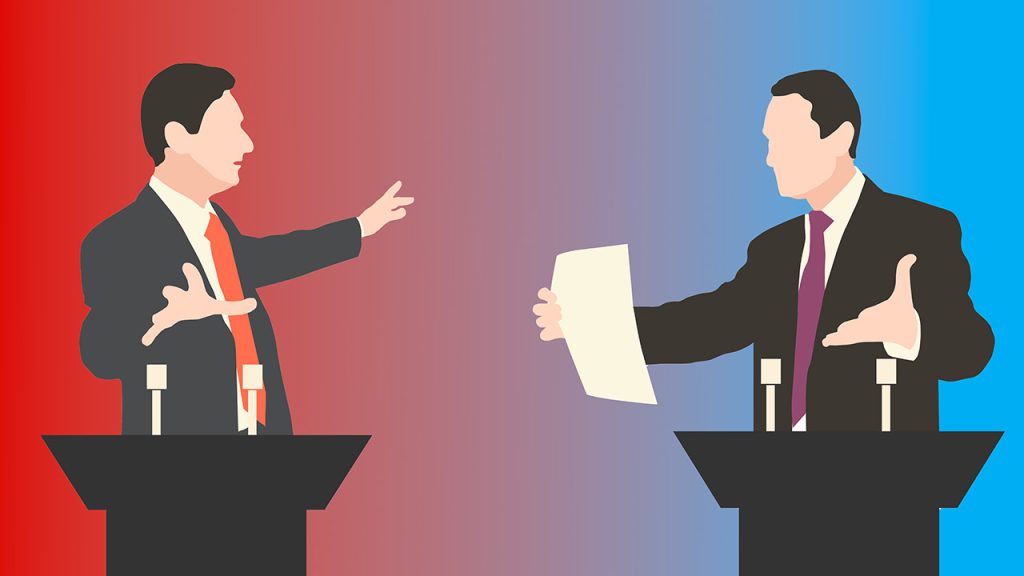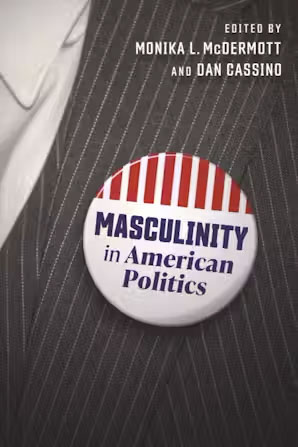To understand U.S. politics, one needs to understand masculinity—and not just by looking at our most stereotypically manly presidents, says a new book co-edited by political science professor Monika McDermott, Ph.D.
Titled Masculinity in American Politics, it collects essays from scholars across the country to address a topic rising to the fore in the political sphere. The book shows how masculinity and its stereotypes affect campaigns and elections, sometimes in surprising ways.
Campaigning on Masculine Themes
Among other things, the book shows how women candidates feel pressure to highlight masculinity in their campaign messages—with Latinas and Asian American women more likely to rely on masculine imagery.
It shows how precarious manhood—anxiety that one’s masculinity is under threat—can lead politically liberal men to embrace more aggressive policies, such as the death penalty and the use of military force.
One of McDermott’s own co-authored essays centers on U.S. Sen. John Fetterman, who suffered a stroke in 2022 during his campaign and was treated for depression after taking office. The stigma surrounding disability hurt his masculine image—even though Fetterman “looks about as masculine as you’re ever going to get,” she said.
McDermott’s goal was to foster a more nuanced understanding of masculinity in American politics at all levels—all the more important because of the emergence of Donald Trump, “an unapologetic masculine figure,” she said. With this book, she’s continuing a research interest that began years ago—with a novel classroom exercise that generated surprising findings among her students.
How did the subject of masculinity in politics capture your interest?
The fields of psychology and sociology have long understood the difference between sex and gender—sex is biological and gender is the social construct, but political science still uses the term ‘gender’ to refer to sex. I wrote a book in 2016 that made that distinction after seeing it play out in the classroom. I was teaching a class on gender and politics, and I decided to give my students the Bem Sex Role Inventory, or BSRI, which measures how masculine or feminine one’s psychological profile is. A lot of the women found out their profiles were deemed more masculine than feminine, and even more masculine than the men in the class. It caused quite a stir, and the wheels started turning.
Why is this more nuanced view of gender in politics important?
The power structure in our country has always been based on traits traditionally seen as masculine, like dominance and forcefulness, at least according to the BSRI. Those are the traits that we value in leaders. Aggression is one trait, and I think it can be negative, neutral, or positive, depending on the direction it takes. By not examining that, we’re leaving out an awful lot of the explanation of what’s going on in our politics.
The book mentions inequities in politics because of the emphasis on masculinity. Can you elaborate?
Female candidates face a double bind because they need to show some masculinity to prove that they can lead and fight for you in Congress, things like that. At the same time, if they’re not feminine enough, they’re seen as overstepping traditional sexual norms. Plus, women aren’t recruited to be candidates at the same rates as men are, so those who don’t show masculine traits very strongly don’t put themselves forward to run; they doubt their own abilities to compete.
What do you hope people take away from the book?
That academics aren’t just trying to trash masculinity. That’s not what this book is about—it’s an objective look at masculinity, and in some ways its positive effects. I think a healthy masculinity means you have strong leadership skills, you have independence, you have your own beliefs and you’re willing to defend them, but you’re also willing to listen to other people’s beliefs and not just close it down with no discussion. And I think there are lots of political leaders who are like that.
You’ve mentioned you want to study the ‘manosphere’ next. Tell me more.
This is the part of the internet that is dedicated to traditional masculinity and hyper-masculinity and promoting that, in reaction to this sense that males are being attacked and aren’t getting their fair share and things like that. I’m going to research whether it played a significant role in the 2024 election when Trump started going on these shows and promoting his campaign. The question is, to what extent did their ‘bro’ following then become politicized and possibly change the profile of the electorate?


